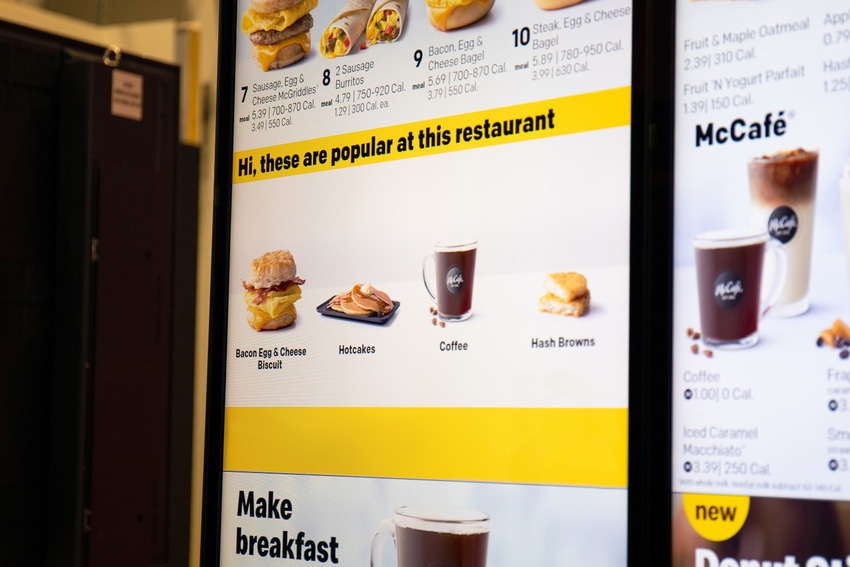McDonald's Is Putting AI in Its Drive-Thrus
McDonald's is using machine learning to make its drive-thru menus smarter. But it's only the beginning of a trend of retailers embracing AI in brick-and-mortar locations.
March 29, 2019

|
McDonald's new menus will offer customers food selections based on factors such as time of day, weather, and restaurant traffic. (Image source: McDonald's / Dynamic Yield) |
Amazon, Netflix, and plenty of other online services already use machine learning algorithms to cater your experience to your preferences and those of the wider community. Why shouldn't your fast food drive-thru do the same? McDonald's has announced plans to bring machine learning to its drive-thru experience through an acquisition of Dynamic Yield, a New York-based company that creates artificial intelligence-driven personalization solutions. The $300 million acquisition will allow McDonald's to roll out new functionalities in its drive-thrus throughout 2019 that will allow menus to display food options based on a number of variables including the time of day, weather, how frequently items are purchased, and even how busy the restaurant is.
What that means for consumers is the creation of an Amazon-like smart menu capable of creating a more efficient and personal drive-thru experience. Imagine being prompted to buy cold drinks or desserts on a hot day. Or perhaps it's early in the morning and the menu knows you'll be more likely to want a cup of coffee. Perhaps it's lunch hours and the menu knows consumers are probably looking for cheap dollar-menu options before they have to run back to the office.
According to McDonald's this move will make it among the first companies to integrate decision technology into the customer point of sale at brick and mortar locations.
It will not, however, be the end or the last. In the last year a number of big names in retail including Walmart, Nordstrom, Nike, and Walgreens have acquired AI startups for the purpose of implementing machine learning into the consumer experience – primarily for tracking and suggesting purchases and for targeted marketing.
"Technology is a critical element of our Velocity Growth Plan, enhancing the experience for our customers by providing greater convenience on their terms," Steve Easterbrook, President and CEO of McDonald's, said in a press statement. "With this acquisition, we're expanding both our ability to increase the role technology and data will play in our future and the speed with which we'll be able to implement our vision of creating more personalized experiences for our customers."
AI-based technologies are set to be a key driver of marketing and sales in the coming years, as more and more companies look to provide a custom feel and touch to consumers' shopping experiences. Brick and mortal businesses in particular can benefit from providing an experience more akin to the ease and intimacy of online retail as point-and-click becomes the preferred mode of shopping.
RELATED ARTICLES:
Electronics retailer Best Buy, for example, has become somewhat of a fairy tale hero in the era of Amazon shopping. Where other electronics retailers such as CircuitCity and RadioShack have shuttered their physical stores in recent years, Best Buy has weathered the storm and even thrived, in part because of a focus on delivering a personal customer experience.
Research from the McKinsey Global Institute has shown that AI has potential to add financial value to a number of industries including automotive, electronics, aerospace, defense, chemicals, agriculture, and oil and gas. According to the McKinsey Global Institute the biggest value add is in retail, with AI predicted to add $2.6 trillion in value to marketing and sales by the year 2020.
“Chains like McDonald’s have been acquiring intellectual property and/or technology for years,” Karl Volkman, CTO the IT solutions firm SRV Network, told Design News via email. “In doing so, they are able to take this technology and apply it to improving their own bottom line. For example, in 2016, Subway acquired Avanti Commerce, a Canadian e-commerce company, in order to improve their own digital strategy and encourage customers to order Subway from their app. It was a move which proved very fruitful, and it’s no wonder other chains are quickly trying to scoop up the best and breaking technology that the industry has to offer.”
The added benefit to busy consumers, Volkman noted, is that this technology could reduce human error and drastically reduce restaurant waste. For example, if a restaurant isn't selling much of a particular item, a system could be set up so that that item is re-stocked at a lower rate.
“With this technology, McDonald’s is going to know its customers better than ever before,” Volkman said. “Just like Netflix or Amazon starts to suggest you programs, books, or products based on your past purchases and watched programs, the fast food giant will be able to apply this same technology into making sure that restaurants are stocked with what customers really want…and only what they want.”
Chris Wiltz is a Senior Editor at Design News covering emerging technologies including AI, VR/AR, blockchain, and robotics
ESC BOSTON IS BACK! The nation's largest embedded systems conference is back with a new education program tailored to the needs of today's embedded systems professionals, connecting you to hundreds of software developers, hardware engineers, start-up visionaries, and industry pros across the space. Be inspired through hands-on training and education across five conference tracks. Plus, take part in technical tutorials delivered by top embedded systems professionals. Click here to register today! |
About the Author(s)
You May Also Like


.jpg?width=300&auto=webp&quality=80&disable=upscale)


